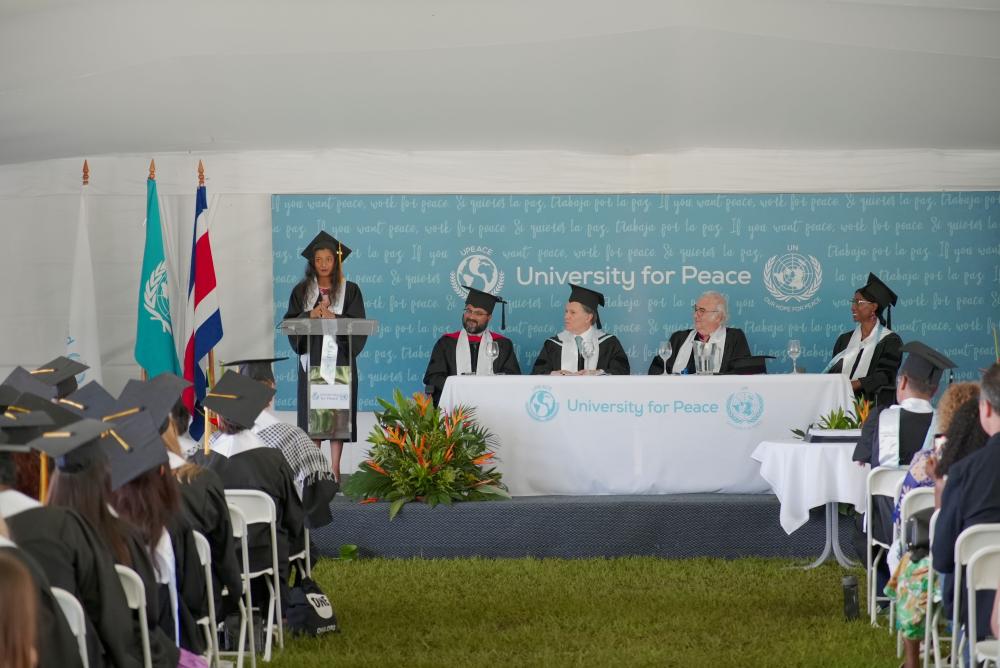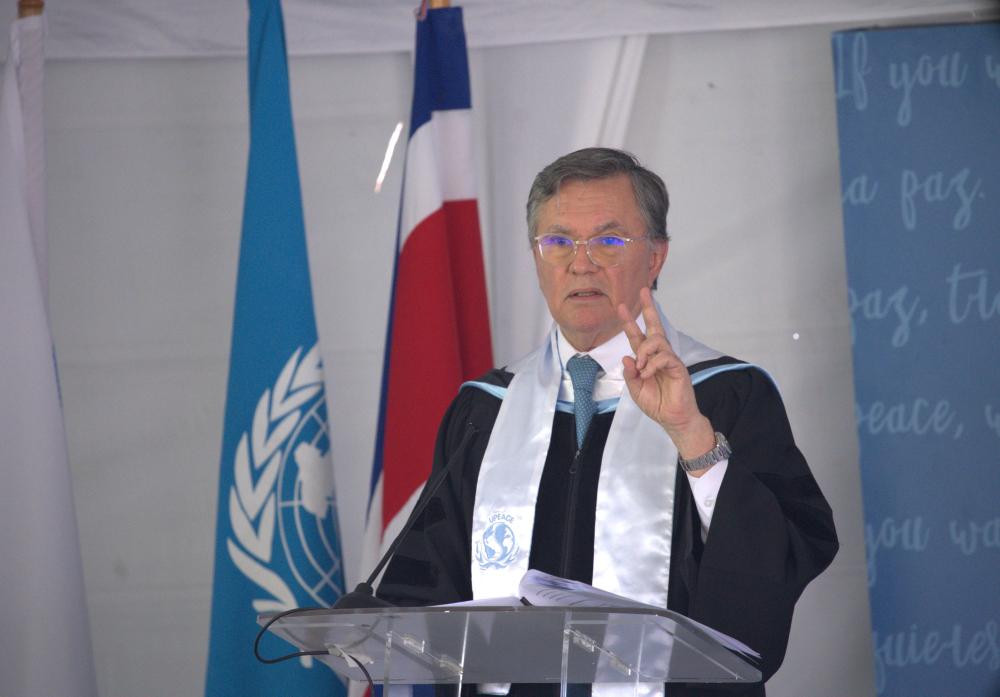Agriculture is essential for world peace due to its contribution to food security, development and social cohesion, states IICA Director General at the graduation ceremony of the University for Peace

San Jose, 13 June 2024 (IICA) – As the keynote speaker at the graduation ceremony of around 130 students from 60 countries, who celebrated the completion of their master's degrees at the University for Peace (UPEACE), the Director General of the Inter-American Institute for Cooperation on Agriculture (IICA), Manuel Otero, urged students to value and strengthen the vital importance of agriculture and agrifood systems for peace, given their contribution to food security, economic development and social cohesion.
Amidst the green forest of the UPEACE campus, located 25 kilometers from San José, and invited to the ceremony by its Rector Francisco Rojas Aravena, Otero explained that in 2023, at least 300 million people around the world suffered from hunger, most of them due to armed conflicts.
In rural areas, he continued, these conflicts weaken governance and destroy agriculture, creating an environment of insecurity and violence that forces migrations and causes fierce competition for natural resources.
Otero urged the graduates to incorporate into their work agendas the relevance of the agricultural sector in Latin America and the Caribbean for its economic, social, and political contributions, as well as for foreign relations and the global influence of the countries in the region, given their role as exporters of food and energy and their abundance of natural resources.
The Director General of IICA spoke to an audience of 300 participants in the closing ceremony of the 2023-2024 academic year of UPEACE, which has been established in Costa Rica since its creation in 1980 by a resolution of the United Nations General Assembly. In this country, UPEACE is established as an international organization, similar to IICA, whose headquarters have also been in San José since its creation in 1942.
The approximately 130 UPEACE students who graduated, both in person and virtually, obtained their master's and doctoral degrees in the fields of Environment and Development, International Law, Peace and Conflict Studies, and Regional Studies.
At least two-thirds of the graduating class this year, which represents all regions of the world, are women.
“Choosing a career, a master's degree, a university, is generally one of the most important decisions in our lives. But choosing peace as the guiding principle of this effort shows the intensity and depth of your social commitment and your responsibility to achieve one of the highest ideals of human development”, Otero told the graduates.
Francisco Rojas Aravena, the University’s Rector, echoed Otero’s sentiments and urged the students to protect the legacy of “democracy, freedom, cooperation, solidarity, and peace”, built on the ruins left by World War II. "The democratic system is only possible in peace”, Rojas stated.
Crucial for development
“Peace, and its absence, affects us all, and has an impact on countless aspects of our planet, our common home, including natural resources. In this context, I invite you to reflect on the fundamental role of agriculture in building peace through its social, economic, and environmental contributions. Agriculture, farmers, and rural territories are the key ecosystem for the food and nutritional security of our societies. Therefore, they are essential for peace”, stated the Director General of IICA.
In this vein, he commented that the integration of world, trade, and scientific and technological advances of the last two centuries, have changed the nature of relationships between countries, but not their intensity. “Agriculture and agrifood systems continue to be a substantial, if not the most important, component of human activities”.

As an example of this importance to the planet, he explained that in Latin America and the Caribbean, agriculture and agrifood systems generate more than 30% of the gross domestic product and about 14% of employment, making them of absolute relevance when addressing poverty, nutrition, health and social cohesion.
The agricultural sector of this region, he emphasized, also faces vulnerabilities related to climate change, with extreme weather events such as droughts, floods and hurricanes.
A region of peace
In the face of the challenge to move towards agriculture that is more resilient to climate change and extreme events, more sustainable and efficient in using natural resources, and capable of feeding the growing global population, Otero called for optimism and urged the students to consider science as an ally to drive a new “Green Revolution”. This would be akin to the one led by the American agronomist and geneticist Norman Borlaug in the 1960s, which resulted in a rapid increase in the production of wheat, rice and maize to combat food insecurity.
“I believe that a new green revolution is possible, because the Americas are a region of peace and cooperation. This gives us an immense social capital to face our hemispheric challenges and those of the world”, Otero asserted.
“To you, the graduates of 2024, the range of innovative programs you have followed at UPEACE places you in a strong position to contribute significantly and make a difference in addressing these and other complex challenges of today’s world that compromise global peace”, he concluded.
More information:
Institutional Communication Division.
comunicacion.institucional@iica.int